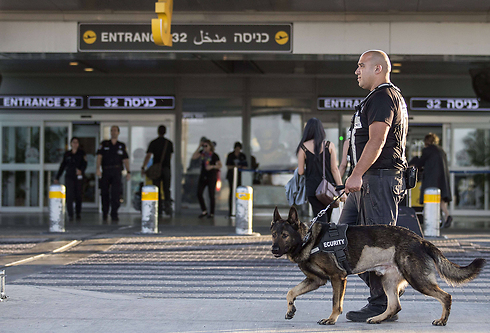
Illustration
באדיבות אמריקן איירליינס
Netanyahu's plan to stop terrorists, int'l criminals from entering Israel
Israel to set up database of personal information collected by airlines on passengers to help authorities identify suspicious people and prevent them from entering the country.
While the international community is battling the Islamic State, al-Qaeda and international crime, Israel has been trying to create a database of personal information provided by airlines on passengers arriving, departing or connecting through Israel. The database will allow Israel to stop a suspicious passenger from boarding a flight even before takeoff, or alternatively require strict security checks.
This database will collect two types of data on passengers:
1. API database: Basic biographical information on a passenger and information on the flight gathered during check-in, usually by scanning the passenger's passport. Among other things, this information will include the passenger's name, date of birth, gender, nationality, type of identification and the ID number, the name of the country that issued the identification, the airline, the flight number, the date and time of takeoff, the airport the flight originated from, the date and time of landing, etc.
In an attempt to deal with the phenomenon of foreign fighters joining terror organizations like the Islamic State, the United Nations passed a resolution earlier this year calling on member states to order airlines operating in their territories to provide API data to the relevant authorities in order to identify passengers classified by the UN Security Council as al-Qaeda operatives and report them to the UN.
The demand for such data was meant to stop passengers from entering a country even before they arrive there, in order to avoid having to deny entry after passengers have already landed in the country. Thirty-nine countries are already requiring airlines to provide them with API data (including the United States, Canada and Japan), and 32 additional countries plan on introducing this requirement in the near future.
2. PNR database: This database includes unverified personal information given voluntarily by passengers to the airlines, who collect and use it for commercial purposes. Most of this information is considered a commercial secret for airlines. The data might include personal information about the passenger like his home address, his cellphone number, his e-mail, information on the travel agency, means of payment, billing address, seat number, flight route, whether a car was rented or a hotel room booked, information about luggage (the number of suitcases and their weight), frequent flier information, travel history and whether the passenger booked a flight in the past that he failed to show up for.
At present, there are nine countries that require PNR data from airlines (including the US, Canada, Britain and Australia), and 33 countries that intend to implement the use of this database.
Fighting recruitment to Islamic State
Prime Minister Benjamin Netanyahu is pushing for the database, detailing terror attacks committed inside Israel, or against its citizens abroad, which made use of commercial flights. Among others, he mentioned the story of Hussein Mohammed Hussein Miqdad, a Hezbollah operative who arrived in Israel on a flight from Switzerland with the intention of committing a terror attack, but was seriously wounded while handling explosives in a hotel room in East Jerusalem when he was trying to assemble the explosive device.
On Sunday, Netanyahu will raise his database initiative to a vote in the cabinet. The ministers will be asked to approve the formation of a task team led by the head of the counter-terrorism unit, who will be joined by representatives from the Shin Bet, Mossad, Police, the Anti-Trust Authority, the Transportation Ministry, the Justice Ministry, the Tax Authority, Customs, the Health Ministry, the Population and Immigration Authority, the Defense Ministry, the Foreign Ministry and others.
The task team will examine ways to use the database to improve Israel's border control and the handling of illegal immigrants, among other things. The task team will make its recommendations within 120 days.
"Much like API data, PNR data can be used to fight the phenomenon of Western citizens, including Israelis, going to Syria to fight for local terror organizations like the Islamic State, and in order to monitor suspicious behavior," Netanyahu's proposal read. "Collecting the data, analyzing it and using it - in accordance with the appropriate protection of individual rights - could greatly aid Israeli authorities in the fight against terror and serious crime."
According to Netanyahu, the use of these databases has led to great success in global crime fighting: European countries reported that most drugs seizures are a result of the use of PNR data. Belgium reported 95 percent of its drugs seizures in 2009 were made possible thanks to analyzing this type of data.












